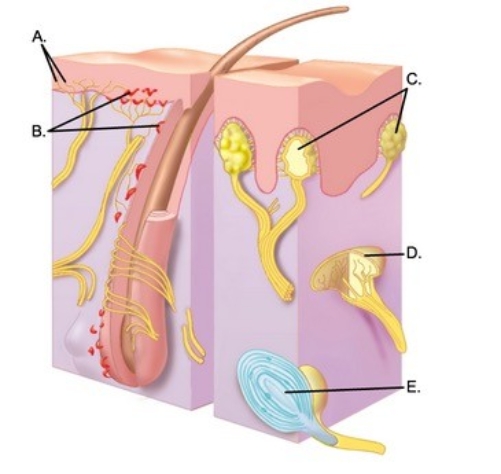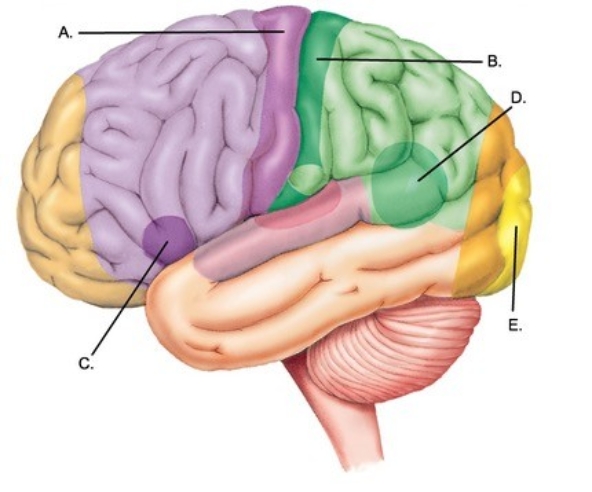A) Mechanoreceptors
B) Thermoreceptors
C) Nociceptors
D) Chemoreceptors
E) Photoreceptors
Correct Answer

verified
Correct Answer
verified
Multiple Choice
Which of the following result when the spinal cord is hemitransected (cut) on the left side? (1) Loss of pain and thermal sensations below the injury on the left side (2) Loss of pain and thermal sensations below the injury on the right side (3) Loss of fine touch and pressure sensations below the injury on the left side (4) Loss of fine touch and pressure sensations below the injury on right side (5) Loss of fine motor control on the right side below the injury (6) Loss of fine motor control on the left side below the injury
A) 1, 3, 5
B) 2, 4, 6
C) 2, 3, 6
D) 1, 3, 4, 6
E) 1, 4, 5, 6
Correct Answer

verified
Correct Answer
verified
Multiple Choice
The ________ tract and the ________ tract make up the pyramidal system.
A) corticobulbar; spinocerebellar
B) corticospinal; corticobulbar
C) reticulospinal; spinothalamic
D) rubrospinal; reticulospinal
Correct Answer

verified
Correct Answer
verified
True/False
The ability to detect simultaneous stimulation at two points on the skin is called two-point discrimination.
Correct Answer

verified
Correct Answer
verified
Multiple Choice
Vision is dependent upon ________.
A) chemoreceptors
B) photoreceptors
C) thermoreceptors
D) mechanoreceptors
E) nociceptors
Correct Answer

verified
Correct Answer
verified
Short Answer
 -What is the function of the sensory receptor of the skin labeled "D"?
A) Detects deep pressure, vibration, and proprioception
B) Responds to painful stimuli
C) Responds to light touch and superficial pressure
D) Detects touch, involved in 2-point discrimination
E) Detects continuous touch or pressure
-What is the function of the sensory receptor of the skin labeled "D"?
A) Detects deep pressure, vibration, and proprioception
B) Responds to painful stimuli
C) Responds to light touch and superficial pressure
D) Detects touch, involved in 2-point discrimination
E) Detects continuous touch or pressure
Correct Answer

verified
Correct Answer
verified
Multiple Choice
If the Broca area is damaged, the result is
A) loss of memory.
B) impairment in the movement of the right leg.
C) blindness.
D) hesitant and distorted speech.
E) inability to think of things to say.
Correct Answer

verified
Correct Answer
verified
Multiple Choice
Receptors that in general produce an action potential in response to a receptor potential are ________ receptors.
A) phasic
B) primary
C) secondary
D) tonic
Correct Answer

verified
Correct Answer
verified
Multiple Choice
Select the structure considered a primary receptor.
A) Pacinian corpuscle
B) Balance receptor
C) Hearing receptor
D) Taste receptor
Correct Answer

verified
Correct Answer
verified
Multiple Choice
Match the term with its definition. -Hippocampus
A) The part of the brain involved in actual declarative memory
B) The largest of the cerebral commissures
C) A factor than activates gene transcription for formation of dendritic spines
D) A series of neurons involved in long-term memory
E) A part of the temporal lobe involved in adding emotional overtones to a memory
Correct Answer

verified
Correct Answer
verified
True/False
The conscious awareness of stimuli received by sensory receptors is called perception.
Correct Answer

verified
Correct Answer
verified
Multiple Choice
A decreased sensitivity to a continued stimulus defines the term ________.
A) adaptation
B) perception
C) sensation
D) conditioning
Correct Answer

verified
Correct Answer
verified
Multiple Choice
Match the term with its definition. -Amygdala
A) The part of the brain involved in actual declarative memory
B) The largest of the cerebral commissures
C) A factor than activates gene transcription for formation of dendritic spines
D) A series of neurons involved in long-term memory
E) A part of the temporal lobe involved in adding emotional overtones to a memory
Correct Answer

verified
Correct Answer
verified
Multiple Choice
Slowly adapting proprioceptors that would let you know the position of your thumb without looking at it are known as ________ receptors.
A) phasic
B) primary
C) secondary
D) tonic
Correct Answer

verified
Correct Answer
verified
Multiple Choice
Match the term with its definition. -CREB
A) The part of the brain involved in actual declarative memory
B) The largest of the cerebral commissures
C) A factor than activates gene transcription for formation of dendritic spines
D) A series of neurons involved in long-term memory
E) A part of the temporal lobe involved in adding emotional overtones to a memory
Correct Answer

verified
Correct Answer
verified
Multiple Choice
If you feel someone touch you on the shoulder, the person has stimulated a/an ________ sense.
A) special
B) somatic
C) visceral
D) undifferentiated
E) None of the choices are correct.
Correct Answer

verified
Correct Answer
verified
Multiple Choice
Which of these activities is associated with the left cerebral hemisphere in most people?
A) Motor control of left side of the body
B) Mathematics and speech
C) Spatial perception
D) Recognition of faces
E) Musical ability
Correct Answer

verified
Correct Answer
verified
Multiple Choice
Which of the following is an example of adaptation of sensory receptors?
A) Ignoring the presence of clothes
B) Being aware of our body parts at all times
C) Continual monitoring touch signals
Correct Answer

verified
Correct Answer
verified
Short Answer
 -Label area "C" on the cerebral cortex.
A) Visual cortex
B) Primary motor cortex
C) Primary somatosensory cortex
D) Motor speech area (Broca area)
E) Sensory speech area (Wernicke area)
-Label area "C" on the cerebral cortex.
A) Visual cortex
B) Primary motor cortex
C) Primary somatosensory cortex
D) Motor speech area (Broca area)
E) Sensory speech area (Wernicke area)
Correct Answer

verified
Correct Answer
verified
Multiple Choice
The ________ are distributed throughout the dermal papillae and are involved in ________ touch.
A) Merkel disks; very deep
B) Pacinian corpuscles; very light
C) Muscle spindles; fine proprioceptive
D) Golgi tendon organs; limited awareness
E) Meissner corpuscles; two-point discrimination
Correct Answer

verified
Correct Answer
verified
Showing 81 - 100 of 149
Related Exams